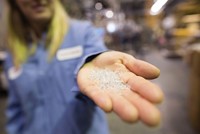Advertisement
Grab your lab coat. Let's get started
Welcome!
Welcome!
Create an account below to get 6 C&EN articles per month, receive newsletters and more - all free.
It seems this is your first time logging in online. Please enter the following information to continue.
As an ACS member you automatically get access to this site. All we need is few more details to create your reading experience.
Not you? Sign in with a different account.
Not you? Sign in with a different account.
ERROR 1
ERROR 1
ERROR 2
ERROR 2
ERROR 2
ERROR 2
ERROR 2
Password and Confirm password must match.
If you have an ACS member number, please enter it here so we can link this account to your membership. (optional)
ERROR 2
ACS values your privacy. By submitting your information, you are gaining access to C&EN and subscribing to our weekly newsletter. We use the information you provide to make your reading experience better, and we will never sell your data to third party members.
Investment
France wins chemical and pharma projects
Push by President Macron nabs investment in plastics recycling, chemicals, and pharmaceuticals
by Alexander H. Tullo
January 20, 2022
| A version of this story appeared in
Volume 100, Issue 3

The latest Choose France event, a program launched by French president Emmanuel Macron to attract foreign investment, has yielded billions of dollars for new projects, including initiatives in plastics recycling, chemicals, and pharmaceuticals from Eastman Chemical, BASF, Pfizer, and other firms.
The largest of the investments is an up to $1 billion commitment from Eastman to build a polyester depolymerization complex in the country. Macron and Eastman CEO Mark Costa announced the investment at an event at Élysée Palace on Jan. 17.
Eastman will use a methanolysis process it developed to break down postconsumer polyethylene terephthalate (PET) into its raw materials dimethylene terephthalate (DMT) and ethylene glycol. The company is building its first such plant in Kingsport, Tennessee. Scheduled for completion by the end of this year, it will have the capacity to break down 110,000 metric tons (t) of PET annually. Eastman expects the French plant to have 160,000 t of capacity and open in 2025.
Eastman intends to build polyester polymer capacity at the site to consume the DMT coming out of the recycling process, but it hasn’t said what kind of polymer. The company exited the PET business a decade ago but is still one of the world’s largest producers of specialty polyester copolymers. In December, Costa told C&EN he wants to keep the monomers from the recycling plants in-house. “Our strategy is not selling intermediates,” he said. “So all these projects will include polymer lines.”
In Kingsport, Eastman has been using the recycled DMT to make Tritan, a fast-growing copolymer used to make housewares and high-end packaging for cosmetics. Recycled content is a selling point for big brand owners. The consumer product firms Danone, Estée Lauder, L’Oréal, and Procter & Gamble have all signed letters of intent to purchase resins from the French plant.
Eastman isn’t the only company that committed to building polyester recycling. The Quebec-based firm Loop Industries chose the occasion to announce that it had selected Port-Jérôme-sur-Seine, in Normandy, as the location to build its own depolymerization unit with the French environmental services firm Suez.
That plant, which will also use methanolysis to break down PET, will have a capacity of 70,000 t per year and cost about $280 million. The companies expect to begin construction in 2023 and have the plant ready 18 months later. Loop is also building a plant in Bécancour, Québec.
On Jan. 17, Macron toured BASF’s facility in Chalampé, France, where the company announced a new plant to make the nylon 6,6 raw material hexamethylenediamine (HMD). BASF acquired the site through its 2020 purchase of Solvay’s nylon business. BASF already makes HMD and its raw material adiponitrile at the site through a joint venture with Invista.
In pharmaceuticals, Pfizer said it will invest $590 million in France over the next 5 years. A big part of this plan is a collaboration with the pharmaceutical chemical firm Novasep, which will manufacture the active ingredient for the COVID-19 antiviral Paxlovid. Novasep plans to begin production at its plant in Mourenx, France, later this year.
Additionally, Pfizer plans to spend on research collaborations with French biotech companies and expand clinical trials at French health-care institutions. According to local reports, other drug firms, including GlaxoSmithKline, Merck KGaA, and Bristol Myers Squibb, are planning French investments as part of the Choose France program.



Join the conversation
Contact the reporter
Submit a Letter to the Editor for publication
Engage with us on Twitter